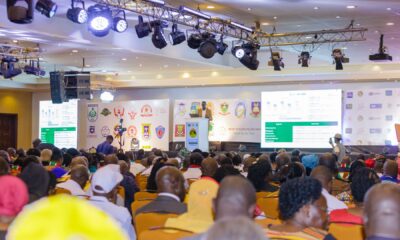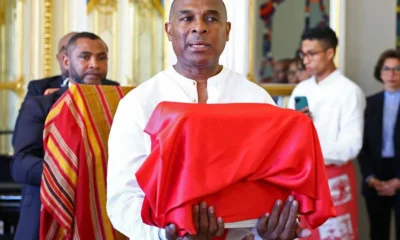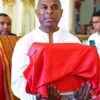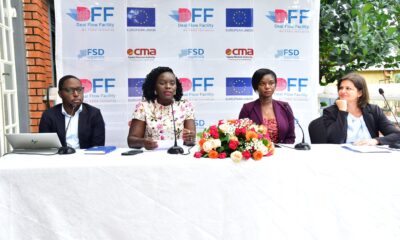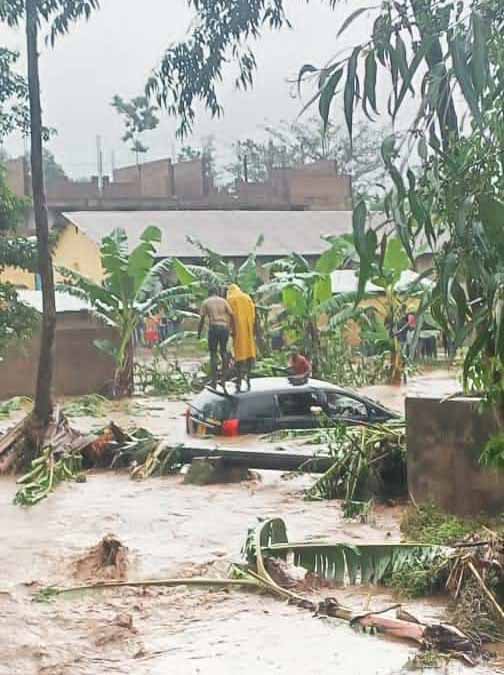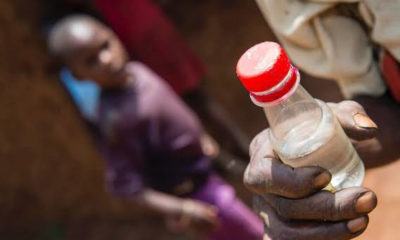Brian Mukalazi
Lessons from the Mbale floods disaster
By the time of writing this, the number of people confirmed dead from the fatal flash floods that rocked Mbale city and surrounding areas on the night of July 30 had hit 30. An estimated 800 households are believed to have been affected, leaving more than 56000 people thousands homeless after their homes were submerged and others destroyed by the floods. Everything was left in ruins.
First, I would like to send my deepest sympathies to all those who lost their loved ones and property. I know that you may be feeling completely lost in the darkness of this calamity. And I know that the floods could have washed away so many valuable things out of your life, but I pray that they do not wash away your strength, hope and positivity.
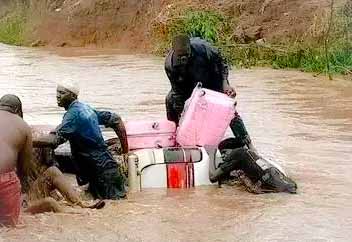
Ordinary folks used rudimentary tools and had no safety gear, to retrieve bodies and property of the deceased
In the same vein, I give kudos to the brave, fearless young men and women who sacrificed their own safety to save the lives of others. The circulated images and video clips of exhausted, half-naked men using rudimentary tools to retrieve bodies and property were both horrifying and heart-warming.
These floods, like many other natural disasters before, caught the country off-guard and on almost all accounts, the response has been a failure. In fact, failure is an understatement; the Mbale floods response has been a national disgrace.
But as a country, we need to ask ourselves some important questions. For instance, where do we go from here? How can we boost our readiness for the next disaster? And how do we turn these failures into future success? Here-under, I will share a few lessons of my own that I have learnt from the Mbale floods disaster.
First lesson: The best possible way of responding to future flood disasters will be through effective preparedness and planning. Based on risk-based disaster scenarios, the country will need to develop well-funded response plans, experimented with simulation exercises. Preparing for major problems requires practice.
The Ministry for Relief, Disaster Preparedness and Refugees can convene critical players, including representatives from National Environment Management Authority, Uganda National Meteorological Authority, District Disaster Management Committees, Non-profit agencies and volunteer groups, to undergo planning exercises in a process I can describe as “Surrounding the problem”
During the simulation, the participants should formulate their responses in real time, breaking into sub-groups according to their specialities: search and rescue, water drainage, temporary housing and more.
The simulation exercises should be as practical as possible. For instance, if a job calls for 100 boats, participants should find those boats and not just wish them to exist. We should not be thinking that magically 100 boats would show up when disaster occurs! If planners need 15 semi-trucks to haul generators to the Elgon region, they need to identify where they would get them or at least make a realistic guess at the source.
Emergency simulations are not supposed to be perfect predictions, just credible ones, and ideally, the parties involved get multiple opportunities to build knowledge and skills that will be needed in an emergency. When disaster strikes, they will already know the players involved. They will understand the linkages in the system. They will know where to go for resources. You do not want to be exchanging business cards in the middle of an emergency!
With such preparations, we can avoid what we saw in Mbale: Residents were using rudimentary tools such as ropes to retrieve bodies and property. Professional divers or marine police could not be spotted anywhere on site. The rescue crew was mostly made up of anti-riot police which evidently had no or limited experience in water-related emergency situations.
The government has been previously criticized for its emphasis on managing the aftermath of catastrophes and not creating initiatives that would diminish their magnitude. Indeed, much of the recrimination over the Mbale floods response came because government authorities apparently failed to have a plan in place to assist in evacuating individuals, providing temporary sheltering, and medical care.
Another key lesson for the government: Improve communication with the public. Before the intense rains that caused the flash floods of July 30/31, there was a constant downpour lasting more than a week but there was no prior warning from the respective government agencies about the impending floods.
There was no information on traffic flows during the floods. No information about the state of roads and bridges. There was also failure to develop and communicate a transportation plan for getting stranded residents out of harm’s way.
Using the various communication channels available today, the public should always be informed of what is happening – before, during and after disasters. This reminds me of the 11 people, travelling in a Toyota Super Custom van to attend a marriage ceremony in Mbale, who tragically perished when their car was swept into the river by the floods. They probably had no idea about what was going on!
Information regarding public transportation during times of natural disasters such as floods is crucial. Emergency crews have to be on hand to quickly distribute and circulate maps regarding changes in transport routes, including sharing information on roads temporarily closed or switched. Entrance into the disaster-hit areas have to be blocked and monitored.
Last lesson: No single training, no matter how ingenious, will ever be sufficient to prepare for a natural disaster. But if we do some things right, the country will certainly incur less expenses in supplemental spending in rebuilding victims and affected areas. And when disasters come, the consequences will be bad but not as bad!
Mr. Mukalazi is a Ugandan Executive and
Socio-Economic Thinker
bmukalazi@ecmafrica.org
Comments





